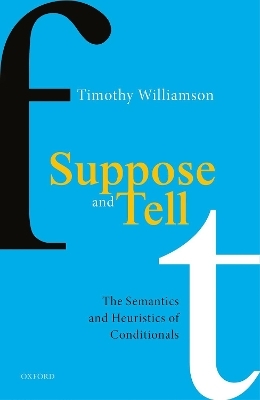
Suppose and Tell
Oxford University Press (Verlag)
978-0-19-886066-2 (ISBN)
What does 'if' mean?
It is one of the most commonly used words in the English language, in itself a sign to the importance of conditional thinking to human cognitive life. We make conditional statements, ask conditional questions, and issue conditional orders. We need to think and talk conditionally for many purposes, from everyday decision-making to mathematical proof. Yet the meaning of conditionals has been debated for thousands of years.
Suppose and Tell brings together ideas from philosophy, linguistics, and psychology to present a controversial new approach to understanding conditionals. It argues that in using 'if' we rely on psychological heuristics, methods which are fast and frugal and mostly, but not always, reliable. As a result philosophers and linguists have been led astray in theorizing about conditionals through trusting faulty data generated by such methods and prematurely rejecting simple theories on the basis of merely apparent counterexamples. This book shows how one such simple theory of conditionals can explain the data, and draws wider implications for the nature of meaning and its non-transparency to native speakers, vagueness in thought and language, and the need for semantics to attend to the unreliable heuristics underlying our judgments.
Timothy Williamson is Wykeham Professor of Logic at the University of Oxford and Whitney Griswold Visiting Professor at Yale University. He has also taught at MIT, Princeton, Edinburgh, Trinity College Dublin, Chinese University of Hong Kong, and elsewhere. He works on logic, philosophy of language, epistemology, metaphysics, and metaphilosophy. His books include Doing Philosophy, Tetralogue, Modal Logic as Metaphysics, and The Philosophy of Philosophy. He is a Fellow of the British Academy, Foreign Honorary Member of the American Academy of Arts and Sciences, and Member of the Academia Europaea.
Preface
Part I: If
1: The Value of Conditionals
2: The Suppositional Rule
3: Consequences of the Suppositional Rule
4: Heuristics within Heuristics
5: Conditional Testimony
6: The Role of Conditional Propositionals
7: More Challenges
8: Interactions between Plain Conditionals and Quantifiers
Part II: Would If
9: Conditionals and Abduction
10: The Interaction of 'If' and 'Would': Semantics and Logic
11: The Interaction of 'If' and 'Would': Heuristics
12: Is 'Would' Hyperintensional?
13: More on the Interaction of 'Would' with Context
14: Thought Experiments and 'Would'
15: Worlds and Meaning
16: Conclusion: Semantics, Heuristics, Pragmatics
| Erscheinungsdatum | 03.01.2020 |
|---|---|
| Verlagsort | Oxford |
| Sprache | englisch |
| Maße | 158 x 240 mm |
| Gewicht | 562 g |
| Themenwelt | Geisteswissenschaften ► Philosophie ► Erkenntnistheorie / Wissenschaftstheorie |
| Geisteswissenschaften ► Philosophie ► Logik | |
| Geisteswissenschaften ► Philosophie ► Sprachphilosophie | |
| ISBN-10 | 0-19-886066-8 / 0198860668 |
| ISBN-13 | 978-0-19-886066-2 / 9780198860662 |
| Zustand | Neuware |
| Informationen gemäß Produktsicherheitsverordnung (GPSR) | |
| Haben Sie eine Frage zum Produkt? |
aus dem Bereich

![Was heißt Denken?. Vorlesung Wintersemester 1951/52. [Was bedeutet das alles?] - Martin Heidegger](/media/113619842)
